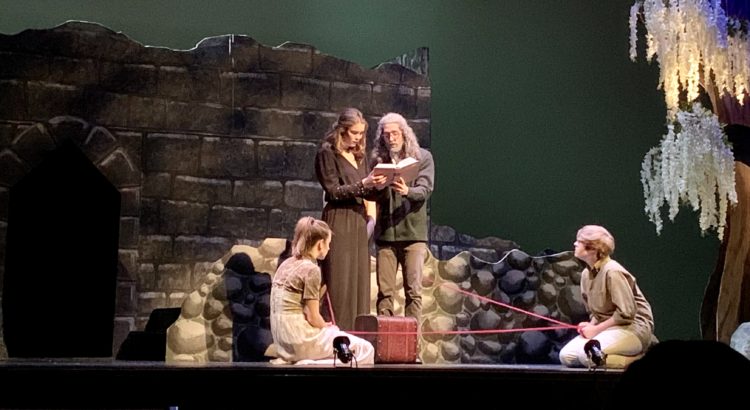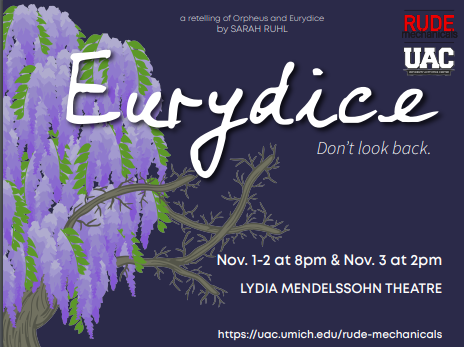Orpheus in the Underworld (translated title) marks the premiere opera this season for the School of Music, Theater, and Dance’s vocal department at the Power Center for the Performing Arts. This runs for one weekend only, so get your tickets soon! Of the many versions of Orpheus and Eurydice’s tragic tale, this reigns as the goofiest production thus far. This whimsical satire is accompanied by fanciful costumes, a wholly creative set, and an ingenious allegory about the nature of capitalism. Director Mo Zhou brilliantly stated: “[Orpheus] is a mirror that reflects not only the capricious antics of the deities but also our contemporary world. It teases out the subtleties and complexities within the upper echelons of society, a world painted in various shades of grey.” (I don’t think I could give a more brilliant explanation if I tried!) I thoroughly enjoyed this opera and thought it was a refreshing choice after last season’s close with Don Giovanni by W.A. Mozart. If opera-singing and can-can-dancing Greek gods are an interest of yours— this opera is for you!
Orphée aux enfers is a French-language opera composed by Jacques Offenbach with a libretto by Hector Crémieux and Ludovic Halévy (English translation by Jeremy Sams). You may be familiar with the famously known and cheekiest song from the opera, the “can-can”, which is often used in pop culture. In the score, it is called the “Galop infernal,” roughly translating to “the hellish gallop”, as they famously kickline in Hades’ Underworld. This opera is conventionally all performed in French, but for this version, all the dialogue was performed in English with arias performed in French. I came into the performance skeptical of this method for continuity’s sake but left the theater agreeing with the decision for a predominantly English-speaking audience. Since many of the performers were native English speakers, it was much easier to make conscious acting choices since they were not dealing with French diction. For an academic setting, this was a great choice! The arias were beautifully performed in the original French, with phenomenal, stand-out performances by Tyrese Byrd (Arsteus/Pluto), Jack Morrin (Jupiter), Sohyun Cho (Eurydice), and Veronica Koz (Cupid). The chorus was equally thrilling and brought a beautiful liveliness to the atmosphere of the show.
The design for this show was spectacular. Scenic design was created by Kevin Judge, costumes by Sarah M Oliver, lighting by Marie Yokoyama, and hair/make-up by Brittney Crinson. Truly, there was always something to look at, or a small detail to become enamored with. Each tableau filled the entire space on the Power Center stage. Within the first moments after the curtain, the set had transported me somewhere. The world that was about to be created was immediately understood by the audience. The colors, dimensions, and vintage image backgrounds were all so charming. The 1950s setting was a very lovely stylistic choice, and I found it well executed throughout. The style was consistent between direction and design choices and these ideas flourished well throughout the show’s tableaus and costuming changes. SMTD has an undoubtedly polished and impressive design team, consistently dazzling audiences with their work on University Productions.
Orpheus in the Underworld was directed by the infamous Mo Zhou, who is fairly new to the School of Music, Theater, and Dance, having joined as an opera director and assistant professor in 2021. Ms. Zhou is greatly appreciated by the opera community for her innovative and fresh ideas in beloved classical works. She has a decorated resume and has worked with renowned classical music programs such as Glimmerglass and Music Academy of the West. She has worked domestically with the Virginia Opera, Minnesota Opera, Boston Baroque, Lyric Opera of Chicago, Houston Grand Opera, and Dallas Opera. Additionally, Professor Zhou has extended her skills to international levels, working with the National Centre for the Performing Arts in China, Staatsoper Unter den Linden in Berlin, and Elbphilharmonie in Hamburg, Germany. Ms. Zhou’s direction is playful, methodical, and keen. Orpheus was a testament to her brilliance—she created beautiful tableaus and effortlessly hilarious yet dramatic moments between characters. I admire her attention to detail in world-building and the thoughtful intentions behind each character.
Orpheus in the Underworld proved to be a hit this Friday at the Power Center. There will be performances on Saturday, November 4th at 8 pm and a Sunday matinee on November 5th at 2 pm. Up next for the voice department will be Gianni Schicchi, the hysterically scandalous Puccini opera. This will be performed in McIntosh Performance Hall in the Moore Building on North Campus, on November 30th and December 1st.


Images thanks to The University of Michigan and the School of Music Theater and Dance Facebook.






